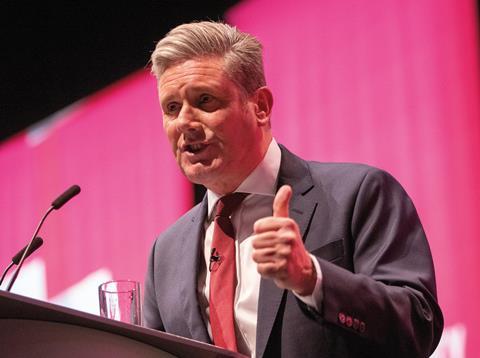Labour is honing its justice manifesto, with equality of arms at inquests top of the agenda. The party also set out its plans for neighbourhood policing and the courts. But what about legal aid?
Increasingly confident that the party will soon return to power, Labour has begun setting out its agenda for government. What can we expect to see on justice in the next general election manifesto?
At the top of its list of priorities is ‘Hillsborough law’. Party leader Sir Keir Starmer (pictured) told a packed conference hall that one of his first acts as prime minister will be to put on the statute book a measure to ensure equality of arms at inquests.

Ahead of the announcement, the party said that, through legal aid, victims of disasters or state-related deaths will receive parity of legal representation.
An independent public advocate will act as a representative for bereaved families. They would advocate for the family’s best interests, and establish a panel to review all the evidence, documentation and data relating to such events.
A duty of candour would require public authorities and officials to proactively cooperate with official investigations.
Public authorities would be required to publish a ‘code of ethics’ that promotes ethical behaviour, transparency and candour. The code would need to take account of the Seven Principles of Public Life, provide reasonable protection for whistleblowers, and offer a publicly accessible complaints system.
A central theme of the conference was that 12 years of Conservative cuts have undermined public services, with police increasingly picking up the pieces as other services are hollowed out. ‘It leads to people thinking no one comes about the smashed window in the town centre, no one comes when the drug dealer is outside the school. People are feeling the police will not be there. These services we depend on, the things that make communities strong, they’re just not there because of the Conservatives’ approach,’ shadow home secretary Yvette Cooper said.
Labour will ‘rebuild’ neighbourhood policing by putting 13,000 additional police and police community support officers on the streets.
'Early intervention saves lives and saves money. Every time I read a serious case review as director of public prosecutions, the story was the same, just a change of name. Another life that could have gone in a different direction if someone had stepped in earlier'
Sir Keir Starmer
The criminal justice system under the Conservative government is ‘absolutely broken’, shadow justice secretary Steve Reed said. The Crown court backlog is hovering around the 60,000 mark and victims face lengthy waits for justice. Reed told several fringe events that his office had been contacted by the family of a young rape victim. She waited two years for her case to come to court. Four days before the trial was due to begin, it was postponed for nine months. Such delays are the norm, Reed said, before announcing that Labour will introduce specialist rape courts in every Crown court.
To tackle the ‘epidemic’ of violence against women and girls, Labour will also establish a ‘domestic violence register’.
Labour recognises the need to punish criminals, but it also wants to tackle the root causes of crime.
Starmer spoke of the need to shift towards a ‘prevention first’ policy. ‘I’ve seen it for myself. Early intervention saves lives and saves money. Every time I read a serious case review as director of public prosecutions, the story was the same, just a change of name. Another life that could have gone in a different direction if someone had stepped in earlier.’
‘Trauma-informed practice’ will be a core approach to Labour’s justice strategy. Reed said New Zealand has a child and young persons wellbeing strategy which has ‘trauma-informed practice right at the core’. A ‘compassion in prisons’ project in the US uses therapeutic practice to help offenders understand their issues, which has had a ‘dramatic’ effect on reoffending rates.
Labour will remove restrictions preventing associate prosecutors from taking on cases currently reserved for Crown prosecutors, shadow attorney general Emily Thornberry said. Labour also wants to remove the ceiling that currently applies to legal executives in the Crown Prosecution Service.
Missing from the agenda? A clear commitment on legal aid funding. ‘Meeting [Bellamy] would be a starting point for us,’ Reed told one fringe event.
Reaction to Labour’s justice agenda has been mixed. Some welcomed Labour’s commitment to tackle what the party has called an ‘epidemic’ of violence against women and girls. But a conference delegate said a rape victim should not be prioritised over a victim of knife crime.
‘Who do Labour think will prosecute and defend in these “specialist courts” (which we already have)? Have they completely missed that we are striking due to the awful rates of attrition at the criminal bar? We need more barristers and judges, not specialist courts,’ one lawyer said.




































3 Readers' comments